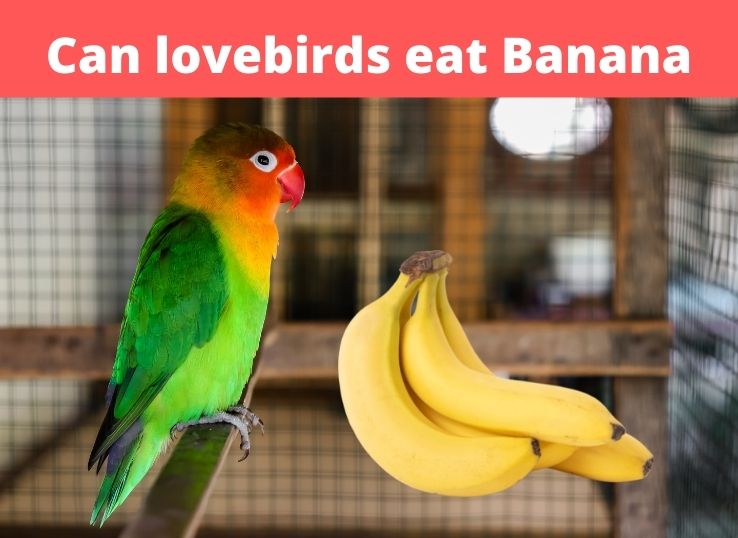Can lovebirds Eat Bananas? (Avian Vet Reviewed)
Last Updated on January 12, 2024 by Ali Shahid

Yes, lovebirds can eat bananas as part of their diet. Bananas provide essential vitamins and minerals like Vitamin A, Magnesium, Vitamin B6, and Iron, making them a nutritious choice for these birds. Moreover, their high moisture content helps in keeping lovebirds properly hydrated. Nonetheless, it’s crucial to offer bananas in moderation due to their natural sugar levels.
Overconsumption might lead to weight gain and potential health issues for the birds. Ideally, fruits, including bananas, should constitute only about 20% of a lovebird’s daily food intake. Providing 2-3 banana slices every other day is adequate for our feathered companions.
When serving bananas, ensure they are thoroughly washed, especially if including the peel, to eliminate any pesticide residues. Opting for organic bananas reduces the risk of pesticide exposure. Additionally, cutting the bananas into smaller pieces will facilitate easier consumption for the lovebirds.
This fruit’s soothing properties and potassium content make it great for completing your Lovebirds’ diet. Every vitamin and mineral we will discuss will be able to help your bird in amazing ways! Let’s get into these questions.
Nutritional Facts of Lovebirds
| Nutrient | Amount (For Humans) |
|---|---|
| Calories | 89 to 112 |
| Water | About 75% |
| Protein | 1.1 to 1.3 grams |
| Total Fat | 0.3 to 0.4 grams |
| Carbohydrates | 22.8 to 28 grams |
| Sugars | 12.2 to 15 grams |
| Fiber | 2.6 to 3.1 grams |
| Vitamin B6 | About 33% of the DV |
| Vitamin C | Significant portion of the DV |
| Potassium | 422 mg (about 9% of the DV) |
| Magnesium | Present in significant amounts |
| Manganese | Present in small amounts |
Health Benefits of Bananas for Lovebirds
Bananas are a popular food choice among lovebirds. Most fruits are safe for your bird to eat, including bananas, and can even provide some benefits. Vitamin A, Magnesium, Vitamin B6, and Iron are all essential nutrients that bananas contain for your bird’s health.
The fruit contains a lot of sugar, though, so you should serve it in small amounts and less frequently. Bananas are best eaten occasionally rather than regularly. In this list, you will find out what vitamins and minerals bananas contain, and why they are great for your Lovebird.
Vitamin A
This vitamin can positively affect the health of many aspects of your lovebirds, including the health of the eye, the health of the feathers, reproduction, and the immune system. Sadly, birds often suffer from Vitamin A deficiency.
When lovebirds are vitamin A deficient, they become susceptible to infections, swollen eyes, dull feathers, wheezing, and weight loss. As a vet, I have also experienced the chipping of the beak and nail due to Vitamin A deficiency.
The nails and beaks of these birds are at risk of breaking if left unchecked. This deficiency can be prevented by eating a healthy diet rich in Vitamin A.
Vitamin C
Your Lovebird must take this vitamin. Vitamin C has anti-stress properties. Mental health can suffer from a Vitamin C deficiency. Vitamin C regulates immunity and builds antibodies in the body. That way, your bird will stay healthy!
Vitamin B6
For a healthy life, vitamin B6 plays a critical role in breaking down proteins. Growth is stunted and appetite is reduced when vitamin B6 is inadequate. A lack of vitamin B6 can make egg production difficult.
Magnesium
There are many reasons why parrots need magnesium. In addition to helping bone development, it aids in feather development, beak development, and nerve impulse development. Additionally, magnesium aids in improving muscle coordination and brain function, as well as enhancing heart health.
Iron
Hemoglobin is made from iron, which transports oxygen in the blood. A bird can develop iron storage disease if he or she consumes too much iron, and anemia if he or she consumes too little iron.
Potential Risks of Overfeeding Bananas to Lovebirds
Feeding your lovebirds too many bananas can result in certain adverse effects due to their sugar-rich nature. Although bananas aren’t harmful to lovebirds when given occasionally, it’s crucial to limit their intake to a few times weekly. Here are some potential consequences of overindulging in bananas:
- Obesity: The sugar content in bananas can lead to weight gain if your lovebird eats them excessively.
- Nutritional Imbalance: Over-relying on bananas might prevent your lovebirds from getting a diverse diet, depriving them of essential nutrients.
- Gastrointestinal Problems: The elevated sugar levels in bananas could cause digestive issues or even diarrhea in lovebirds.
To maintain optimal health, ensure your lovebirds have a well-rounded diet comprising various fruits, veggies, and specialized bird food. Treat bananas as occasional snacks rather than regular food items. Should you observe any unusual symptoms in your lovebird, such as altered behavior, breathing issues, or changes in their droppings, it’s wise to seek advice from a veterinarian promptly.
How to Prepare and Feed Bananas to Lovebirds?
Here are some simple steps to prepare and serve bananas to your lovebirds:
- Choose the Right Banana: Select ripe bananas that aren’t overly soft. Avoid overripe ones as they can become too sticky and sugary, which might not be good for your bird’s health.
- Wash Thoroughly: Always wash the bananas properly to get rid of any pesticides, dirt, or residues that might be on the surface.
- Remove the Peel: Before giving the banana to your lovebird, ensure you peel it. The peel can be tough for them to digest, so it’s best to remove it.
- Cut into Small Pieces: Slice the banana into small, manageable pieces, approximately 1/4″ square, to make it easier for your lovebird to eat.
- Feed in Moderation: Remember, moderation is key. Limit banana treats so they make up only 10-15% of your lovebird’s daily calorie intake.
- Clean the Beak: After your lovebird enjoys its treat, gently wipe its beak using a clean cloth to ensure cleanliness.
By following these steps, you can safely and enjoyably introduce bananas into your lovebird’s diet.
Frequently Asked Questions
Can lovebirds eat banana peels?
The banana peel is safe for lovebirds to eat, but they shouldn’t consume too much as they cannot digest it. Banana peels are a win for your bird since it has a lot of fun using them. However, they may have pesticide residue on them.
Are bananas bad for birds?
Bananas are not bad for lovebirds. Besides bananas, tropical fruits like mangos and guavas are good choices for parrots to eat. To remove any pesticides from the skin of the banana, wash it before feeding it to your parrot.
Can birds eat banana skin?
It isn’t the color of the banana peel that attracts birds, but how it’s prepared matters the most. The birds will not peck at an unpeeled banana, so avoid offering them raw bananas.
Conclusions
In short, lovebirds can eat bananas and they love bananas. Bananas are good for lovebirds, but if they are enjoying them, you might be tempted to overfeed them. You can cause obesity and other problems by overfeeding them.
Make sure that your lovebird has a balanced diet to avoid nutritional deficiencies. If your lovebird seems to be suffering from any health issues, or if you are feeding it a new type of food, you should consult a vet.

